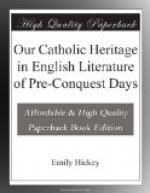And then,
Enlarged was the woman’s soul, the holy one’s hope sprang new.
And she smites the evil general with the strength she had prayed for, and goes forth victorious with her handmaiden, to bear the tidings to her people of the deliverance wrought for them, ascribing the glory to God and His might. Judith leaves the camp of the Assyrians, with her waiting-woman, who carries the head of Holofernes in a bag. Men and women in great multitudes flock to the fortress-gate, pressing and running to meet God’s handmaid, glad of heart to know of her home-coming. They let her in reverently, and the trophy she has brought is shown them. Judith beseeches them to go forth to the fight, as soon as the Maker of the beginning of all things, the King of high honour, hath sent the bright light from the East; to go forth bearing shield and buckler and the bright helmet, to meet the thronging foemen, and fell the folk-leaders, the doomed spear-bearers. Their foes are doomed to death, and they shall have glory and honour in battle. Then follows a great battle, with full victory to Israel.
The poet has varied from the Biblical story, in representing the officers of Holofernes’ army as drunk; and also in telling of a battle after the return of Judith to Bethulia. It also may seem strange that Judith should address the Holy Trinity and each separate Person thereof. The old Christian poet carried his belief along with him, and the handmaid of God, the brave Judith, was to him a follower of Our Lord. The brave Judith, yes! St Dominic’s Third Order was at first, as we know, called “The militia of Jesus Christ.” How Judith would have loved the name! And we may think, may we not? how, looking from her place among the glorified, she smiled on the great warrior Maiden Saint who went in the might of the Lord, to deliver her country from the rule of the stranger.
The story of Judith would especially appeal to people living at a time when incursions of foreigners were well known, and later on, still unforgotten. Abbot AElfric, about whose work I have to tell you something presently, in writing a short account of the Old Testament with its various books, says that the Book of Judith “is put into English in our manner as an example to you men, that you should defend your country with weapons against an invading army”—the word which he uses, “here,” always meaning in old English the army of the Danes. AElfric also wrote “a homily on Judith to teach the English the virtues of resistance to the Danes.”
It is interesting likewise to think that the poet of “Judith” may have had in his mind some great Englishwoman concerning whom he wished in a veiled way to convey well-deserved praise. Perhaps he was inspired to tell of Judith, by the deeds of King Alfred’s daughter, AEthelflaed, known as the Lady of the Mercians, and sought to do honour to her as well as to the great Hebrew lady.




